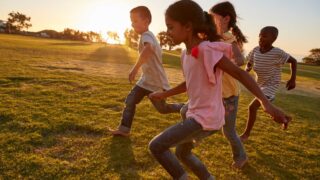Introduction
Smartphones and social media have become inescapable parts of our children’s lives. But as their screen time increases, so do concerns about the impact on their mental health. According to experts like Professor Jonathan Haidt, social media is a significant contributor to rising levels of anxiety, depression, and loneliness in teens. The evidence is mounting, and it’s clear that schools and parents need to take action before it’s too late.
The Real Cost of Social Media on Mental Health
Social media is more than just a way for kids to connect; it’s also become a major source of anxiety and self-doubt. Currently, there is huge attention globally on Jonathan Haidt’s research, his 2024 book ‘The Anxious Generation’, and his proposal for a ‘screen-free childhood’, which highlights how platforms like Instagram and TikTok fuel harmful behaviours, particularly among teenage girls, who are most susceptible to the pressures of comparison and seeking online validation.
Dean McCoubrey, MySociaLife founder, warns that “we’re watching a significant number of this generation (GenZ) struggle with mental health issues, yet we’re not taking the necessary steps to guide them through the dangers of their digital lives.” Studies in Nature confirm that heavy social media use is strongly linked to rising levels of anxiety and depression in young people.
Social media can amplify feelings of isolation, particularly when children and teens feel trapped in a cycle of chasing likes and approval. It’s a far cry from the innocent fun these platforms promise; ironic for a term which promotes socialising. That being said, another segment of the generation report benefits from social media, reaching out to friends and sharing concerns. The debate is complicated and layered.
Why Is It So Hard to Cut Down Smartphone Use?
If you’ve ever tried to limit your child’s screen time, you know how challenging it can be. Social media platforms are designed to keep users coming back for more, often using clever psychological tricks to trigger dopamine rewards. As McCoubrey puts it, “Our kids are stuck in a system that’s been engineered to hold their attention, making it harder for them to disconnect.” This constant stimulation makes social media highly addictive.
Parents often need help figuring out where to start when it comes to setting boundaries. Schools, too, are grappling with how best to tackle the issue of digital safety, as many haven’t fully integrated this into their curriculums. Meanwhile, children are left to navigate a world where they’re bombarded with content designed to trigger emotional highs and lows. The Huberman Lab podcast has spoken at length about how this overstimulation can lead to sleep disruption and heightened anxiety in kids.
What Parents and Schools Can Do?
So, how can we help our kids regain control of their digital lives? The solution lies in a joint effort between parents and schools. Schools need to prioritise teaching digital citizenship, making sure that children understand both the benefits and the risks of social media. “Digital literacy should be treated as a key life skill,” says McCoubrey. “Our kids are living their lives online, so it’s crucial they know how to manage it.”
At home, parents can help by setting clear, realistic boundaries. Yes, some schools or parents can and will ban smartphones, but not the majority, so we still need kids to learn healthier habits. For instance, introducing tech-free times, like during meals or before bed, can make a big difference. Encouraging children to spend more time engaging in real-world activities—whether it’s sports, hobbies, or just hanging out with friends—will help them see that there’s more to life than what’s happening on their screens.
Conclusion
We’re living in a digital age, and smartphones aren’t going anywhere. But that doesn’t mean we have to accept the damage they’re doing to our kids’ mental health. Schools and parents have a responsibility to teach children how to navigate the digital world safely and healthily. By acting now, we can help protect their well-being and ensure they grow up equipped to handle the challenges of both the online and offline world.
Brandstories Disclaimer:
Brandstories is not liable for the contents of the information published on this platform. The information which subscribers publish on this website is for general information purposes only and Brandstories facilitates the ability for viewers and subscribers to access this platform. Subscribers who publish their content on Brandstories are held responsible for their own content. This includes ensuring that it is factually accurate, grammatically correct, free of spelling errors, and does not contain unsavoury content that could result in legal action. In the case of linguistic translations, the onus is on the client to ensure that the translation is accurate. In no event does Brandstories make representations or warranties of any kind, expressed or implied about the completeness, accuracy, reliability, suitability or availability with respect to the information supplied and published. This website includes links to other websites, including third party websites. Brandstories does not recommend, endorse or support any views that are held by subscribers publishing information, and within these links provided. Furthermore, Brandstories does not have control over the nature, contents and availability of information contained on these sites. Any form of reliance readers and consumers may place on information published on Brandstories is strictly at their own risk. Brandstories makes every effort to ensure that the website is up and running smoothly at all times, however Brandstories does not take responsibility for, and will not be held liable for times when the website is temporarily unavailable due to technical glitches that are beyond our control.


